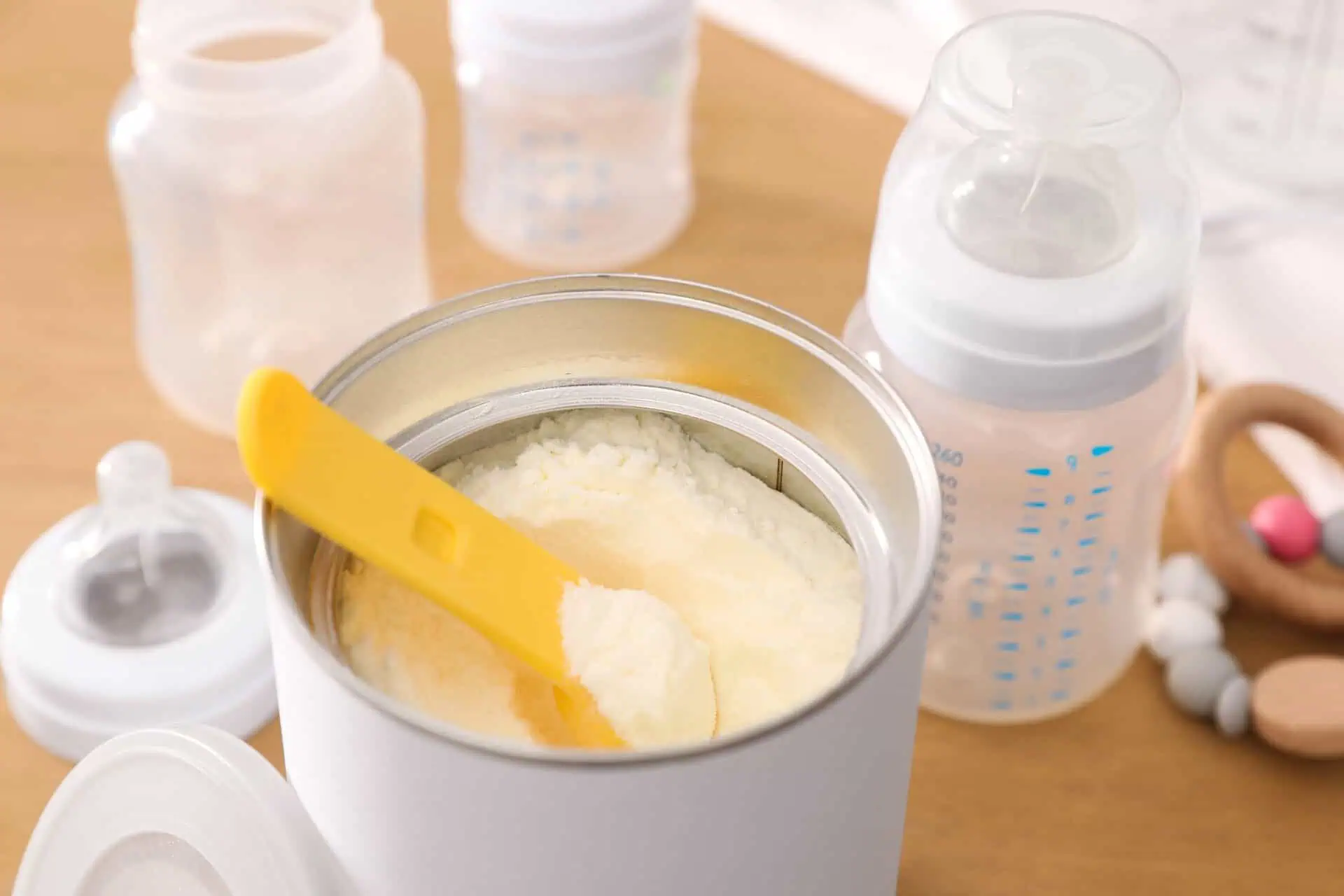NEC Lawsuits Filed on Behalf of Premature Infants Fed Formula
- Last Updated: June 12th, 2025

Attorney Jessica Paluch-Hoerman, founder of TruLaw, has over 28 years of experience as a personal injury and mass tort attorney, and previously worked as an international tax attorney at Deloitte. Jessie collaborates with attorneys nationwide — enabling her to share reliable, up-to-date legal information with our readers.
Legally Reviewed
This article has been written and reviewed for legal accuracy and clarity by the team of writers and legal experts at TruLaw and is as accurate as possible. This content should not be taken as legal advice from an attorney. If you would like to learn more about our owner and experienced injury lawyer, Jessie Paluch, you can do so here.
Fact-Checked
TruLaw does everything possible to make sure the information in this article is up to date and accurate. If you need specific legal advice about your case, contact us by using the chat on the bottom of this page. This article should not be taken as advice from an attorney.
Key takeaways:
- Premature infants fed cow's milk-based formulas like Similac and Enfamil have a higher risk of developing necrotizing enterocolitis (NEC), a severe and potentially fatal gastrointestinal condition, compared to those who receive human breast milk.
- Recent verdicts in NEC lawsuits have awarded substantial damages to plaintiffs, including a $495 million verdict against Abbott Laboratories in July 2024 and a $60 million verdict against Mead Johnson in March 2024.
- Parents of premature infants who developed NEC or other severe health complications after being fed cow's milk-based formula may qualify to pursue compensation using the chat on this page..
Overview of the NEC Lawsuits
On this page, we’ll provide an overview of the NEC lawsuits, studies linking cow-based formula to NEC in premature infants, potential settlement amounts in the NEC lawsuits, and much more.
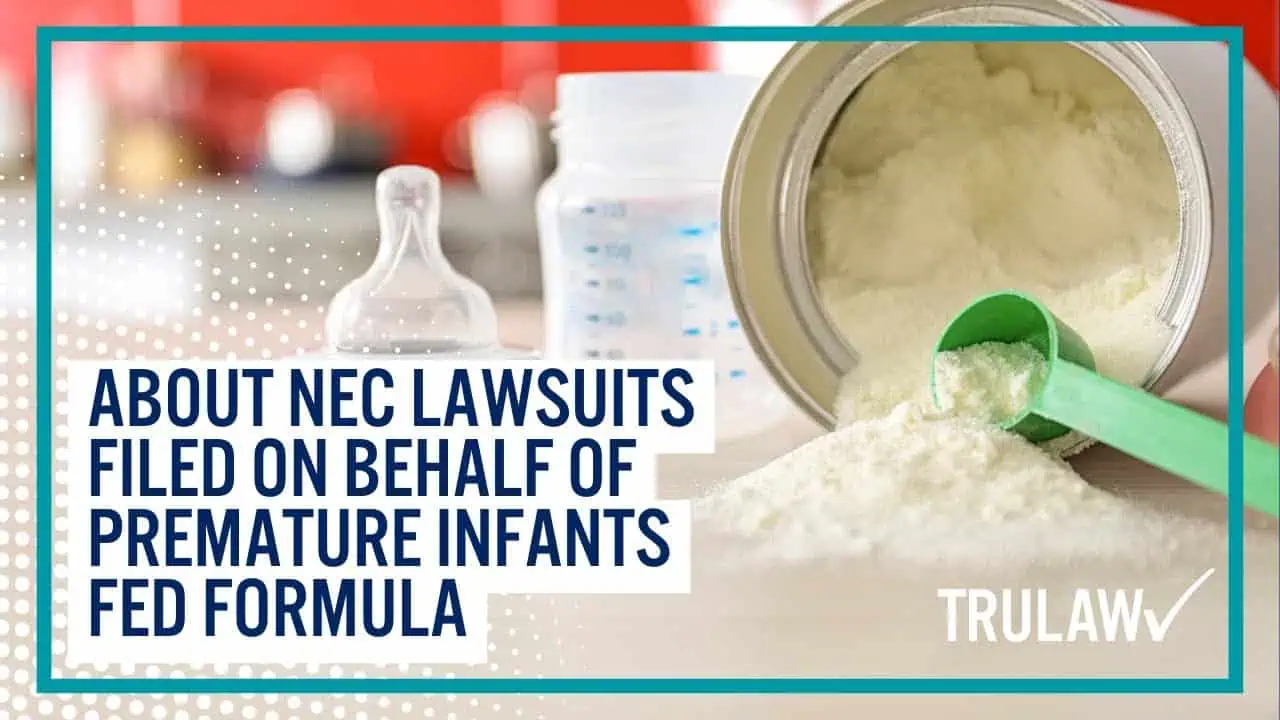
Intro to the NEC Lawsuits
A premature infant is generally considered a birth that occurs before the 37th week of pregnancy, while a normal pregnancy generally lasts up to 40 weeks.
The four (4) stages of preterm include:
- Late preterm – born between 34 and 36 completed weeks of pregnancy
- Moderately preterm – born between 32 and 34 completed weeks of pregnancy
- Late preterm – born at less than 32 completed weeks of pregnancy
- Extremely preterm – born at or before 25 weeks of pregnancy
More than 200,000 premature births occur in the U.S. each year.
If your premature child developed NEC or other severe health complications after being fed cow’s milk-based formula, you may qualify to pursue compensation.
Contact TruLaw using the chat on this page to receive an instant case evaluation and determine your eligibility to join others in filing an NEC lawsuit today.
Table of Contents
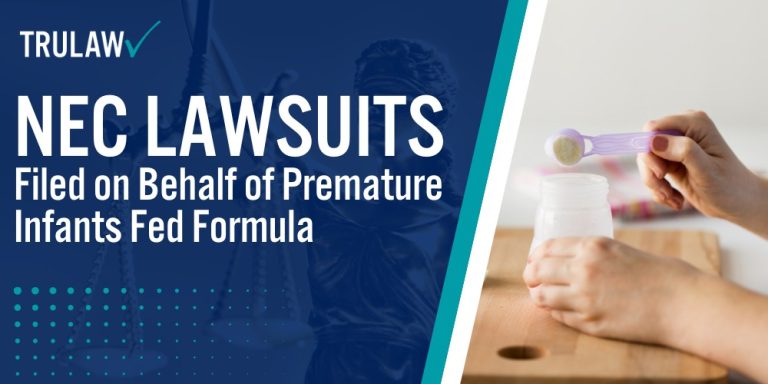
What is Necrotizing Enterocolitis?
Necrotizing enterocolitis (NEC) is a severe and potentially fatal gastrointestinal condition that predominantly affects premature infants.
This devastating disease causes inflammation in the intestines, leading to tissue death.
Bacteria can then infiltrate the bloodstream or abdomen through these damaged areas, significantly increasing the risk of life-threatening complications.
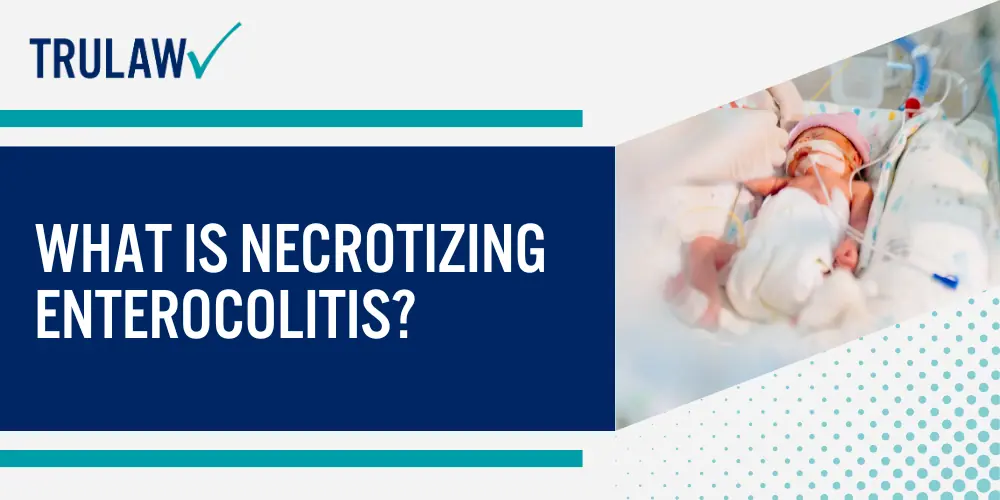
NEC typically manifests within the first two to six weeks after birth, with some infants experiencing mild symptoms, while others endure severe, life-threatening conditions.
Premature Infants in the NICU: Highest Risk for NEC
Premature infants, particularly those in Neonatal Intensive Care Units (NICU), are at the highest risk for developing NEC.
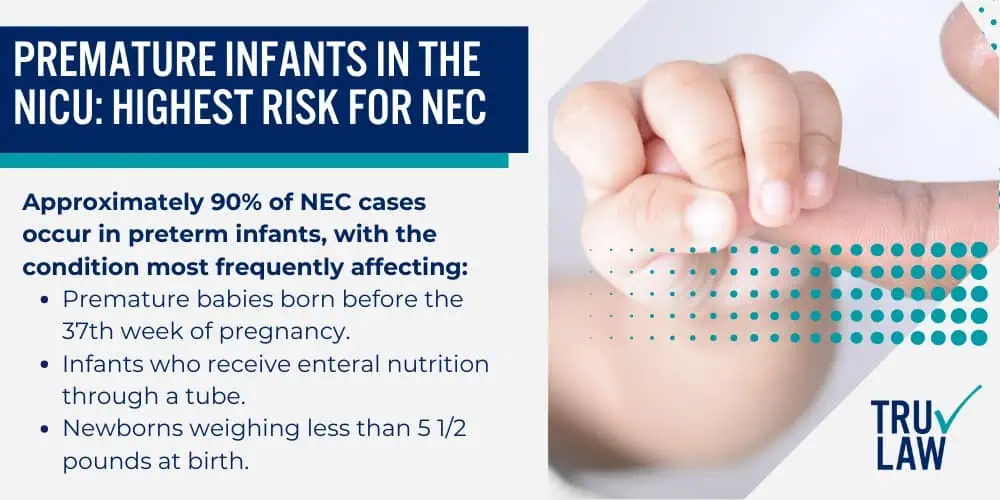
Approximately 90% of NEC cases occur in preterm infants, with the condition most frequently affecting:
- Premature babies born before the 37th week of pregnancy.
- Infants who receive enteral nutrition through a tube.
- Newborns weighing less than 5 1/2 pounds at birth.
The risk of NEC is notably higher in premature infants fed cow’s milk-based formulas, such as Enfamil or Similac, compared to those who receive human breast milk.
Scientific studies have consistently shown that the immature digestive systems of preterm infants are less capable of processing the proteins found in cow’s milk, which can trigger inflammation and increase the likelihood of NEC.
Diagnosing NEC in Premature Infants
NEC is diagnosed very early through a blood test, fecal test or X-ray.
It is also the most common cause of death in hospitalized premature infants more than 2 weeks old.
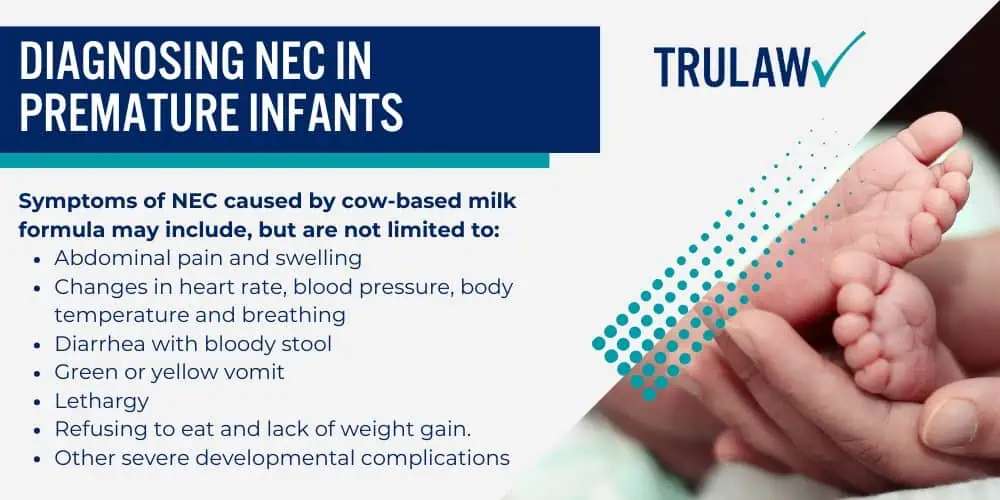
Symptoms of NEC caused by cow-based milk formula may include, but are not limited to:
- Abdominal pain and swelling
- Changes in heart rate, blood pressure, body temperature and breathing
- Diarrhea with bloody stool
- Green or yellow vomit
- Lethargy
- Refusing to eat and lack of weight gain.
- Other severe developmental complications
The ongoing litigation has seen substantial verdicts, including a $495 million award against Abbott Laboratories, highlighting the severity of the allegations.
These cases continue to emphasize the need for safer feeding practices in the care of premature infants and accountability from formula manufacturers.
Studies Linking Cow-based Formula to NEC in Premature Infants
Premature infants are particularly vulnerable due to their underdeveloped digestive and immune systems that are not as strong as those of full-term babies.
When these infants contract an intestinal infection, their weakened systems struggle to combat it effectively.
Extensive studies have demonstrated a significant difference in the risk of necrotizing enterocolitis (NEC) between premature infants who are fed donor human milk (DHM) and those who receive cow’s milk-based formula.
The research shows that preemies fed with DHM have a substantially lower risk of developing NEC, experiencing fewer complications, and requiring less surgical intervention compared to those fed with formula.
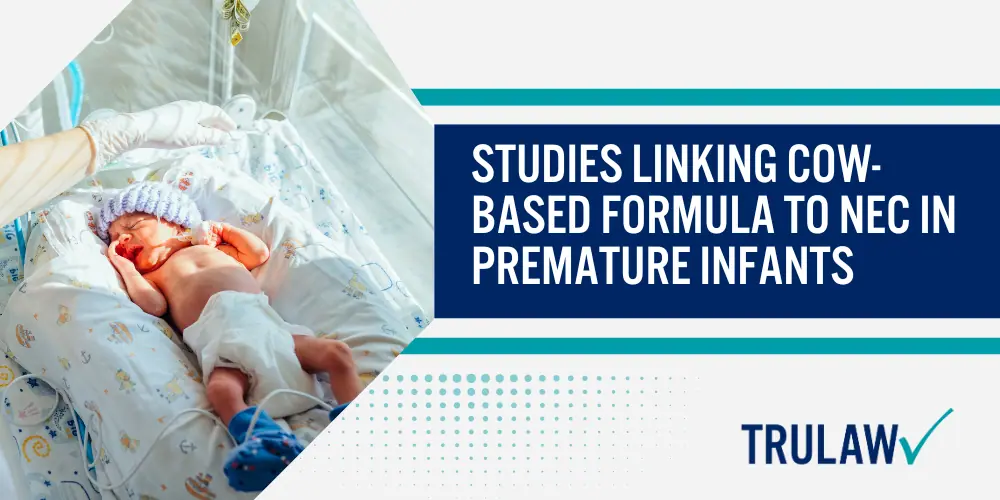
Despite the well-established scientific consensus that donor human milk is a safer alternative for premature infants, the manufacturers of Enfamil and Similac continued to promote their cow’s milk-based formulas.
These companies aggressively marketed their products to the parents of premature babies, both during their time in the Neonatal Intensive Care Unit (NICU) and after they were discharged, capitalizing on the exhaustion and vulnerability of these families.
NEC is a condition that almost always occurs after a baby has begun feeding, indicating that it is unlikely for a preemie to be born with this devastating condition.
While the exact cause of NEC remains partially understood, the risk factors are clearly associated with feeding practices, particularly the use of cow’s milk-based formulas in premature infants.
NEC Prevention – Human Donor Milk
Human donor milk has been shown to significantly reduce the risk of NEC.
Unlike formula, donor milk supports the development of the infant’s immune system and provides critical protection to their digestive tract.
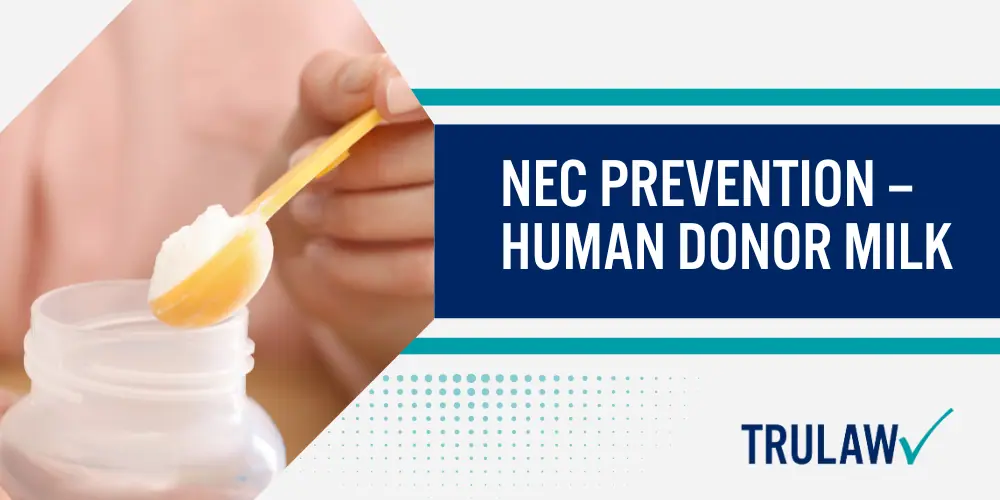
As a result, the use of donor milk is increasingly recognized as a best practice in neonatal care.
Addressing the Challenges of Feeding Premature Babies
Feeding premature babies requires special attention, as these infants can easily become fatigued and require careful handling.
Additionally, mothers of preemies may face challenges in producing breast milk immediately after birth, which adds another layer of difficulty to ensuring that these vulnerable babies receive the nutrition they need to thrive.
Key considerations for feeding premature babies include:
- Availability of human donor milk
- Prevention of necrotizing enterocolitis (NEC) through dietary adjustments
- The role of organizations like the Human Milk Banking Association of North America (HMBANA) in providing support and advocating for donor milk
While brand-name formula costs less than $2 per ounce, feeding a preemie may still cost less than $30 per day.
However, donor milk, which ranges from $3 to $5 per ounce, is more expensive due to the costs associated with collection, processing, and distribution.
HMBANA’s Efforts to Raise Awareness of Parents
Despite the higher cost, organizations like HMBANA are working to make donor milk accessible to all preemies, advocating for it to become a universal standard of care regardless of a family’s financial situation.
Challenges in awareness and informed decision-making:
- Limited information provided to parents about human milk banks
- Prevalence of formula samples in hospital care packages
- The need for transparency regarding the benefits of donor milk versus formula
It is imperative that families are provided with accurate information about the feeding options available to them, including the benefits of donor milk.
If your premature child developed NEC or other severe health complications after being fed cow’s milk-based formula, you may qualify to pursue compensation.
Contact TruLaw using the chat on this page to receive an instant case evaluation and determine your eligibility to join others in filing an NEC lawsuit today.
NEC Lawsuits: Toxic Baby Formula
Parents of premature infants who developed necrotizing enterocolitis (NEC) after consuming cow’s milk-based formulas like Similac and Enfamil are pursuing legal action against the manufacturers.
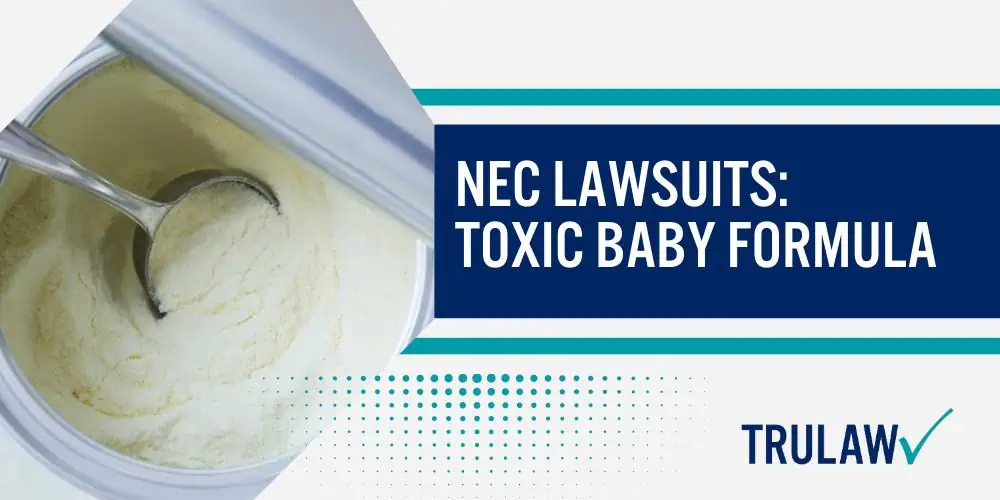
These lawsuits claim that the companies failed to warn about the risk of NEC associated with their products, resulting in severe health consequences for vulnerable infants.
The Impact of NEC on Premature Infants
Necrotizing enterocolitis (NEC) is a severe and often fatal gastrointestinal disease that primarily affects premature infants.
This condition involves the inflammation and death of intestinal tissue, which can lead to life-threatening complications such as sepsis and intestinal perforation.
The risk of NEC is significantly higher in premature infants who are fed cow’s milk-based formulas, such as Similac and Enfamil, compared to those who receive human breast milk.
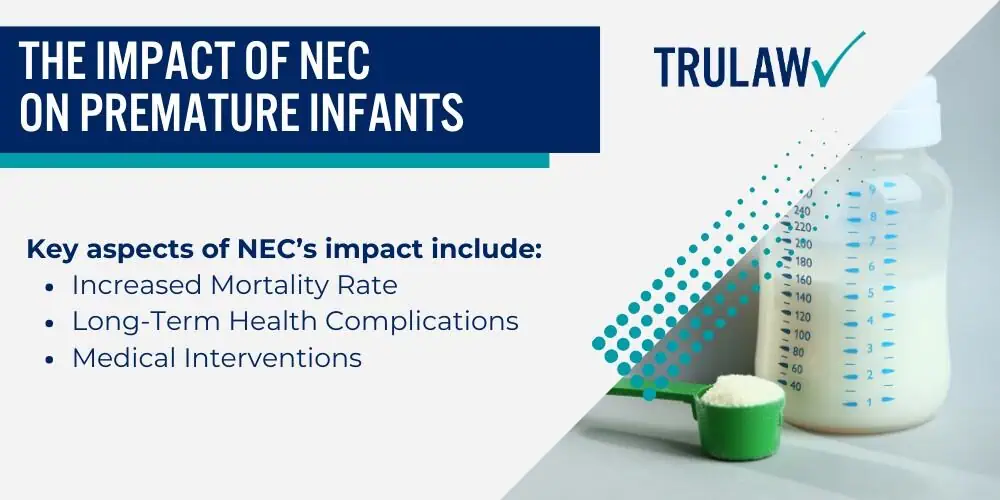
Key aspects of NEC’s impact include:
- Increased Mortality Rate: NEC can be fatal in up to 30% of cases, with the highest risk among the most premature and low birth weight infants.
- Long-Term Health Complications: Survivors of NEC often face long-term health issues, including intestinal strictures, short bowel syndrome, and developmental delays.
- Medical Interventions: Treatment for NEC typically involves stopping oral feedings, administering antibiotics, and in severe cases, performing surgery to remove necrotic bowel tissue.
The impact of NEC on affected families is profound, both emotionally and financially, as they contend with the long-term care and potential disabilities of their children.
The ongoing lawsuits seek to hold the manufacturers accountable for not adequately warning about the dangers of their formulas, which could have prevented many of these tragic outcomes.
Toxic Baby Formula Manufacturers: Abbot and Mead Johnson
The NEC baby formula lawsuits are part of a growing legal battle against the manufacturers of Similac and Enfamil, two widely used infant formulas.
Parents of premature infants who developed necrotizing enterocolitis (NEC) after consuming these formulas are filing lawsuits against Abbott Laboratories and Mead Johnson & Company.
The lawsuits are particularly significant because they highlight the manufacturers’ alleged disregard for scientific evidence linking cow’s milk-based formulas to NEC.
Plaintiffs argue that the companies continued to market their products as safe and nutritionally equivalent to breast milk, despite the known risks.
If your premature child developed NEC or other severe health complications after being fed cow’s milk-based formula, you may qualify to pursue compensation.
Contact TruLaw using the chat on this page to receive an instant case evaluation and determine your eligibility to join others in filing an NEC lawsuit today.
Potential Settlement Amounts in the NEC Lawsuits
The settlement amounts in the Necrotizing Enterocolitis (NEC) multidistrict litigation (MDL) are still uncertain as cases progress.
The MDL consolidates lawsuits where plaintiffs claim that cow’s milk-based formulas, like Similac and Enfamil, caused NEC in premature infants.
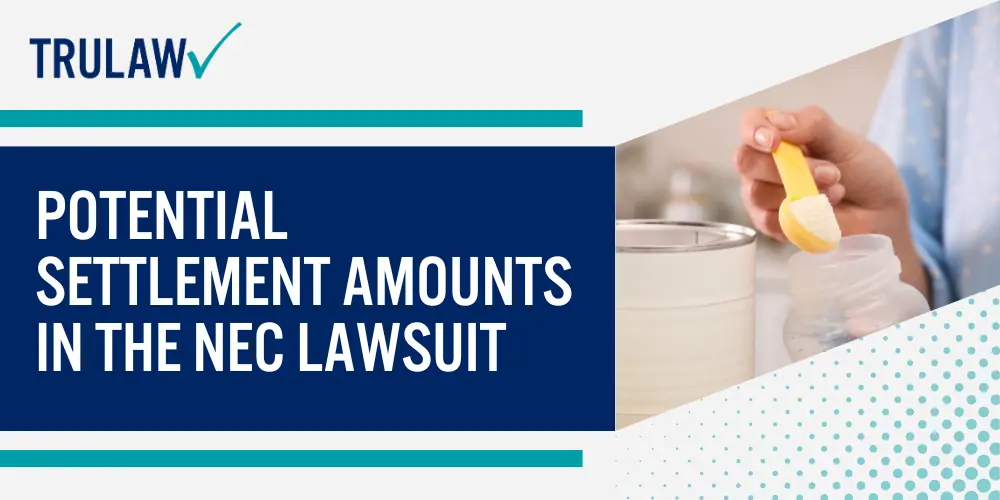
While no global settlement has been reached, estimates suggest settlements could vary widely based on factors such as injury severity, bellwether trial outcomes, and evidence of negligence.
Bellwether Trials Set to Influence NEC Settlement Amounts
Bellwether trials are designed to provide a preview of how juries might respond to the evidence and arguments presented, offering both plaintiffs and defendants insight into the likely outcomes of the broader litigation.
The first bellwether trials in the NEC MDL are expected to commence in 2025.
The selection process for these trials has begun, with twelve cases identified as candidates.
Of these, four cases will be chosen to proceed to trial.
The trials will be conducted alternately between cases selected by the plaintiffs and the defense, spaced approximately twelve weeks apart.
Factors Impacting Potential NEC Settlement Values
Several factors will influence the potential settlement values within the NEC MDL.
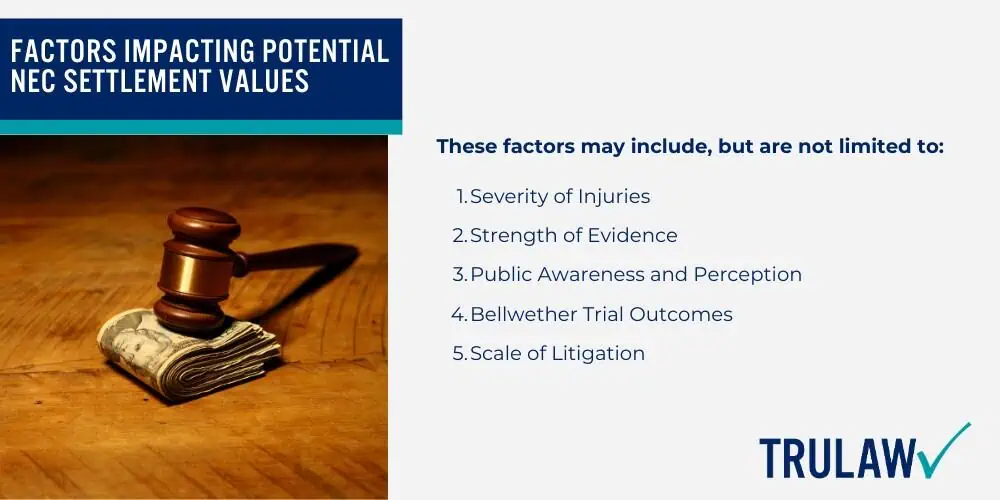
These factors may include, but are not limited to:
- Severity of Injuries: Cases involving severe outcomes, such as infant death or long-term disabilities, are likely to result in higher settlements due to the extent of harm and the need for long-term care.
- Strength of Evidence: The presence of compelling evidence that the formula manufacturers were negligent in warning about the risks of NEC is likely to increase settlement amounts, as it strengthens the plaintiffs’ cases.
- Public Awareness and Perception: Increased public awareness and media coverage of NEC cases could put additional pressure on defendants, influencing the settlement negotiations towards higher amounts.
- Bellwether Trial Outcomes: The results of the bellwether trials will be a major determinant in the settlement amounts for subsequent cases, with favorable outcomes likely leading to higher settlement offers.
- Scale of Litigation: The growing number of cases within the MDL may encourage the defendants to seek a global settlement to mitigate the risks of prolonged litigation and additional high-value verdicts.
As these factors converge, they will significantly shape the negotiation landscape, with the potential for high-value settlements remaining strong, particularly if the bellwether trials favor the plaintiffs.
This could lead to substantial compensation for families affected by NEC.
The Necrotizing Enterocolitis Lawsuit is NOT a class action
NEC lawsuits are currently being filed individually across state courts with hundreds of claims consolidating into multidistrict litigation (MDL) in the Northern District of Illinois.
This consolidation allows for more efficient handling of numerous claims brought by families of infants affected by NEC after consuming cow’s milk-based formulas such as Similac and Enfamil.
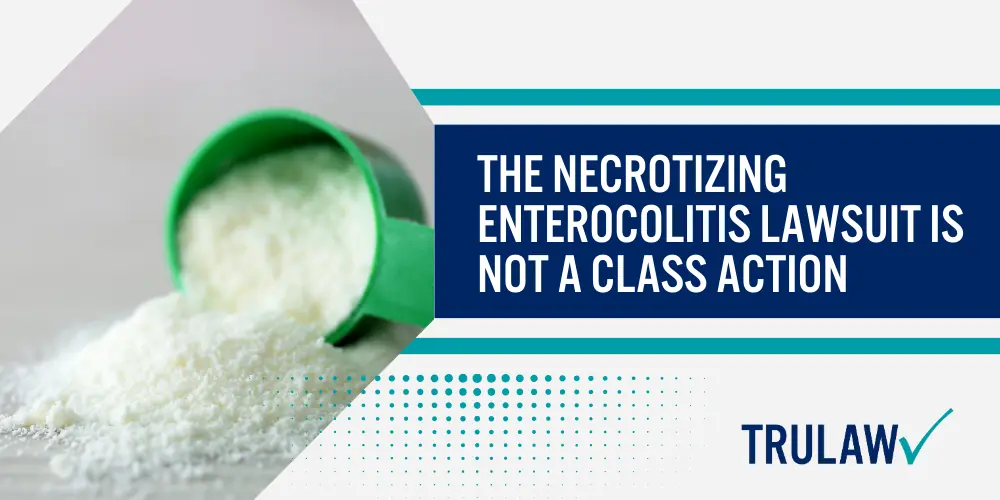
Although these cases are consolidated, they are not considered class actions.
Instead, they fall under the category of “mass torts.”
Mass torts differ from class actions in that each plaintiff’s case is treated individually in terms of damages and legal outcomes, although certain legal and factual questions are handled collectively.
Baby Formula NEC Lawsuit Frequently Asked Questions
-
Necrotizing Enterocolitis (NEC) is a severe gastrointestinal condition that predominantly affects premature infants, causing inflammation and tissue death in the intestines.
Preterm babies, especially those fed cow’s milk-based formulas like Similac or Enfamil, are at the highest risk for developing NEC.
-
Extensive studies have demonstrated that premature infants fed with donor human milk (DHM) have a substantially lower risk of developing NEC compared to those who receive cow’s milk-based formula.
Despite this scientific consensus, manufacturers like Enfamil and Similac continued to promote their cow’s milk-based formulas to parents of premature babies.
-
No, the Necrotizing Enterocolitis Lawsuit is not a class action.
NEC lawsuits are currently being filed individually across state courts, with hundreds of claims consolidating into multidistrict litigation (MDL) in the Northern District of Illinois for more efficient handling.
-
NEC can be fatal in up to 30% of cases, with the highest risk among the most premature and low birth weight infants.
Survivors often face long-term health issues, medical interventions, and the profound emotional and financial impact on their families.
-
The NEC baby formula lawsuits are part of a growing legal battle against the manufacturers of Similac and Enfamil, two widely used infant formulas.
Parents of premature infants who developed NEC after consuming these formulas are filing lawsuits against Abbott Laboratories and Mead Johnson & Company.
-
While no global settlement has been reached, estimates suggest NEC lawsuit settlements could vary widely based on factors such as injury severity, bellwether trial outcomes, and evidence of negligence.
The results of the bellwether trials, set to commence in 2025, will be a major determinant in the settlement amounts for subsequent cases.

Managing Attorney & Owner
With over 25 years of legal experience, Jessica Paluch-Hoerman is an Illinois lawyer, a CPA, and a mother of three. She spent the first decade of her career working as an international tax attorney at Deloitte.
In 2009, Jessie co-founded her own law firm with her husband – which has scaled to over 30 employees since its conception.
In 2016, Jessie founded TruLaw, which allows her to collaborate with attorneys and legal experts across the United States on a daily basis. This hypervaluable network of experts is what enables her to share the most reliable, accurate, and up-to-date legal information with our readers!
Additional Baby Formula NEC Lawsuit resources on our website:
Here, at TruLaw, we’re committed to helping victims get the justice they deserve.
Alongside our partner law firms, we have successfully collected over $3 Billion in verdicts and settlements on behalf of injured individuals.
Would you like our help?
At TruLaw, we fiercely combat corporations that endanger individuals’ well-being. If you’ve suffered injuries and believe these well-funded entities should be held accountable, we’re here for you.
With TruLaw, you gain access to successful and seasoned lawyers who maximize your chances of success. Our lawyers invest in you—they do not receive a dime until your lawsuit reaches a successful resolution!
AFFF Lawsuit claims are being filed against manufacturers of aqueous film-forming foam (AFFF), commonly used in firefighting.
Claims allege that companies such as 3M, DuPont, and Tyco Fire Products failed to adequately warn users about the potential dangers of AFFF exposure — including increased risks of various cancers and diseases.
Depo Provera Lawsuit claims are being filed by individuals who allege they developed meningioma (a type of brain tumor) after receiving Depo-Provera birth control injections.
A 2024 study found that women using Depo-Provera for at least 1 year are five times more likely to develop meningioma brain tumors compared to those not using the drug.
Suboxone Tooth Decay Lawsuit claims are being filed against Indivior, the manufacturer of Suboxone, a medication used to treat opioid addiction.
Claims allege that Indivior failed to adequately warn users about the potential dangers of severe tooth decay and dental injuries associated with Suboxone’s sublingual film version.
Social Media Harm Lawsuits are being filed against social media companies for allegedly causing mental health issues in children and teens.
Claims allege that companies like Meta, Google, ByteDance, and Snap designed addictive platforms that led to anxiety, depression, and other mental health issues without adequately warning users or parents.
Transvaginal Mesh Lawsuits are being filed against manufacturers of transvaginal mesh products used to treat pelvic organ prolapse (POP) and stress urinary incontinence (SUI).
Claims allege that companies like Ethicon, C.R. Bard, and Boston Scientific failed to adequately warn about potential dangers — including erosion, pain, and infection.
Bair Hugger Warming Blanket Lawsuits involve claims against 3M — alleging their surgical warming blankets caused severe infections and complications (particularly in hip and knee replacement surgeries).
Plaintiffs claim 3M failed to warn about potential risks — despite knowing about increased risk of deep joint infections since 2011.
Baby Formula NEC Lawsuit claims are being filed against manufacturers of cow’s milk-based baby formula products.
Claims allege that companies like Abbott Laboratories (Similac) and Mead Johnson & Company (Enfamil) failed to warn about the increased risk of necrotizing enterocolitis (NEC) in premature infants.
Here, at TruLaw, we’re committed to helping victims get the justice they deserve.
Alongside our partner law firms, we have successfully collected over $3 Billion in verdicts and settlements on behalf of injured individuals.
Would you like our help?
